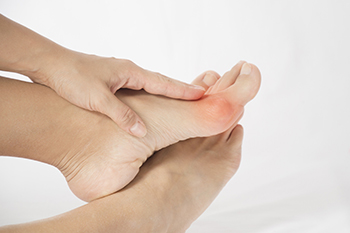
Bunions are a common foot deformity where the joint at the base of your big toe becomes enlarged and shifts outward. This misalignment can lead to a visible bump on the side of the foot and discomfort during daily activities. Early signs of bunions include redness, swelling, thickened skin, and tenderness around the big toe joint. As the condition progresses, pain may worsen, and wearing shoes can become increasingly uncomfortable. Bunions can be caused by genetics, wearing improper footwear like tight or high-heeled shoes, flat feet, or arthritis. The pain can feel like a persistent ache or sharp discomfort when walking or standing for long periods. A podiatrist can evaluate the severity of the bunion and provide relief through conservative treatments like padding, orthotics, footwear changes, and anti-inflammatory therapies. In more severe cases, surgery may be recommended to correct the deformity. If you have a painful bunion, it is suggested that you schedule an appointment with a podiatrist for appropirate treatment.
If you are suffering from bunions, contact one of our podiatrists of Centers for Foot & Ankle Care. Our doctors can provide the care you need to keep you pain-free and on your feet.
What Is a Bunion?
A bunion is formed of swollen tissue or an enlargement of boney growth, usually located at the base joint of the toe that connects to the foot. The swelling occurs due to the bones in the big toe shifting inward, which impacts the other toes of the foot. This causes the area around the base of the big toe to become inflamed and painful.
Why Do Bunions Form?
Genetics – Susceptibility to bunions are often hereditary
Stress on the feet – Poorly fitted and uncomfortable footwear that places stress on feet, such as heels, can worsen existing bunions
How Are Bunions Diagnosed?
Doctors often perform two tests – blood tests and x-rays – when trying to diagnose bunions, especially in the early stages of development. Blood tests help determine if the foot pain is being caused by something else, such as arthritis, while x-rays provide a clear picture of your bone structure to your doctor.
How Are Bunions Treated?
- Refrain from wearing heels or similar shoes that cause discomfort
- Select wider shoes that can provide more comfort and reduce pain
- Anti-inflammatory and pain management drugs
- Orthotics or foot inserts
- Surgery
If you have any questions, please feel free to contact one of our offices located in Merrillville, Portage, Michigan City/LaPorte, and Schererville, IN . We offer the newest diagnostic and treatment technologies for all your foot care needs.
